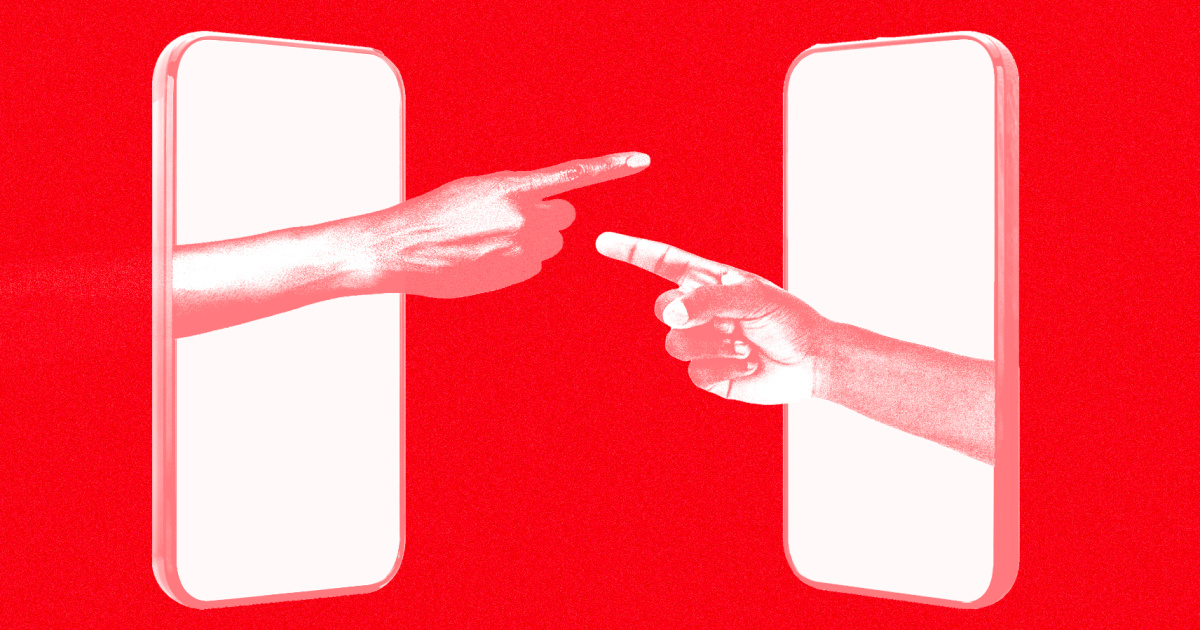
In a social media post, a Black woman decried a group of Black men standing nearby on the street. Shouting tearfully, the woman, Roda Osman, who is known online as Ro Bashe, recounts being attacked by a man who had recently fled. She refused to give the man her phone number. In the video she appears to have a large knot on her cheek.
“Yo, this man just hit me in my face with a brick and all these Black men just watched,” Osman said in the clip reposted by The Shade Room, which has more than 1 million likes.
While some Black women online called out the alleged bystanders’ inaction and the decision not to intervene, some Black men in turn resurfaced Osman’s old social media posts, accusing her of a history of inflammatory behavior and untrustworthy character.
With a lack of clarity on what went down, some — women and men alike — called “brickgate” a hoax, comparing Osman to Carlee Russell, a Black woman who was charged with two misdemeanors in July after apologizing for faking her own kidnapping.
In an exclusive interview for the first time since the attack earlier this month, Osman told NBC News that she has suffered daily panic attacks and nightmares as a result of the online vitriol.
Osman said there is little she can do to convince people who still do not believe her story.
“First they’re like, ‘where’s the police report?’ You don’t have a police report.’ I show the police report. Then they’re like, ‘Oh, it’s a fake police report,’” she said. “Then they’re like ‘Show us the hospital records. You don’t have hospital records.’ I show them the hospital records. ‘It’s fake hospital records.’”
“The goal posts will never be met,” she said.
NBC News reviewed a police report filed on Sept. 3 and hospital records with results from a physical exam. Records indicate her left ear had blood coming out of the canal and the left side of her face was swollen with bruising and tenderness.
Osman said police have identified a suspect for the assault and the investigation is ongoing.
“I don’t know how I’m going to support myself. I don’t know how I’m going to graduate on time. I don’t know how I’m going to, you know, feel safe again.” she said.
“It’s going to take months, maybe a year, maybe longer in my life to get it back together.”
“Brickgate” points to a familiar pattern of backlash hurled at Black women when they publicly denounce harm from Black men. And while it appeared to be an isolated act of violence, the back-and-forth from detractors and supporters of Osman represents long-simmering tensions between Black women and men that now play out on social media. The source of that continued tension, experts say, is unaddressed anguish from both Black men who deal with rigid views of masculinity and Black women who feel neglected in light of demeaning stereotypes pinned to them.
Decades of strife
Examples of this dynamic are pervasive. Rapper Tory Lanez was convicted and sentenced to 10 years in prison last month for shooting rapper Megan Thee Stallion in the foot in 2020. Throughout the trial, online agitators repeatedly accused Megan Thee Stallion of lying or wanting to ruin the career of a successful Black man. More than three decades ago, similar accusations were hurled at Anita Hill when she accused Clarence Thomas, then a nominee for the U.S. Supreme Court, of sexual harassment.
When the film “The Color Purple” premiered in late 1985, it provoked uproar among Black men and women concerning the depiction of Black men’s behavior, E.R. Shipp reported in The New York Times in 1986. The film chronicled the life of Celie, played by Whoopi Goldberg, who is abused by her husband, Albert, and finds solace in the sisterhood she cultivates with other Black women.
At the time Oprah Winfrey, another star, defended the film, saying it represented one woman’s history, not the entire history of Black people, and many other Black women said it accurately portrayed their experiences. Meanwhile Black men and some Black women argued that it was inaccurate and harmful, especially since the film itself and the broader entertainment industry continuously failed to feature positive portrayals of Black men.
Books like Alice Walker’s “The Color Purple,” which inspired the film, along with other works including Michele Wallace’s “Black Macho and the Myth of the Superwoman” and Maya Angelou’s “I Know Why the Caged Bird Sings” were created during a literary renaissance for Black women in the 1970s, said Riché Richardson, a professor of African American literature at Cornell University. These works openly grappled with abuse Black women and girls experienced and fueled growing “tensions between Black men and women on the basis of gender,” she said.
Animosity fed by trauma
Some Black men are reluctant to acknowledge how their behavior may play a role in the trauma of Black women, said Mark Anthony Neal, the chair of the department of African and African American studies at Duke University. Black women’s search for accountability after violence has occurred often gets misconstrued as attacks on the character of Black men at large.
“There’s a generation of Black men who, particularly in the post-Obama years, have not had the kind of life and professional successes that they want,” Neal said. “And sometimes they see Black women promoted in certain kinds of ways. They’re really in their feelings that as Black men they’re being left behind.” This disaffected bloc of Black men may feel less convicted to stand up for Black women, Neal said.
Osman called the reactions to her case, however, displays of Black male fragility.
“I am an independent, strong, educated, successful Black woman,” she said. “That makes a lot of them just infuriated by my existence alone.”
“Everybody’s like, ‘Oh, come on. Tell me what you did to him. What did you do? Did you taunt him?” she said. “It’s so ironic to me that they’re like, ‘I can’t believe somebody would do something that violent for no reason.’ But then you’re online being violent for no reason.”
“People are calling my son’s school saying they’re going to come and rape my son,” she said. “Somebody sent me some soup and was like ‘Choke and die on this, b—.’”
To some Black women, though, silence after a public call-out can be disheartening, especially considering the disproportionate rates of domestic violence they face. 2020 data from the National Coalition Against Domestic Violence shows that 45.1% of Black women have experienced intimate partner violence and that an estimated 51.3% of Black women homicides are related to intimate partner violence.
In cases where Black women have been criticized for coming forward, they are treated less as victims and face scrutiny as if they are “somehow at fault for the violence done against” them, said Shoniqua Roach, assistant professor of Black studies and gender studies at Brandeis University.
Brian Ellison, founder of The Black Man Project, an organization that provides group therapy for Black male youth, said he believes misunderstanding between Black men and women stems from unresolved past trauma. “I feel that’s where a lot of things get lost in translation,” Ellison said. “We’re trying to compare the pain that we both feel. In reality we are both hurt.”
Some of Black women’s frustrations are rooted in feeling rejected by Black men, according to Dianne Stewart, the Samuel Candler Dobbs professor of religion and African American studies at the Emory College of Arts and Sciences. She referred to general observation and data showing that Black men are twice as likely as Black women to marry someone outside of their race.
Racial stereotypes painting Black women as aggressive and sexually promiscuous also “run rampant in American culture and even among Black men themselves,” she said. As a result, Black women have pushed against these stereotypes while simultaneously having to be leaders of their households, which in return can “sometimes make Black men feel inadequate.”
During the post-slavery era, Black families were founded upon heteronormative, patriarchal structures, Stewart said. Many free Black people went on a desperate search to find their family members, who were separated during slavery, a time when Black family units confronted constant disruption. Marriage was used as a way to help strengthen these weakened Black family structures.
Yet, Stewart said it was a “landmark moment” when Black people began to internalize and emulate white Western understandings of patriarchy — which are reflected in the dynamics of Black relationships today.
Young Black boys are socialized to believe they must “be the bigger person” and “leaders,” in their relationships with women, said Roderick L. Carey, assistant professor in the department of human development and family sciences at the University of Delaware.
As girls around them come of age and may express self-empowerment, Black boys may feel conflicted about their roles. “‘You know, I’m supposed to protect you, I’m supposed to defend you. But also, I’m noticing that you have a lot of capacity to protect yourself and defend yourself,’” Carey said.
The path to healing
For Black men, social media acts as a forum where they can go to “air their grievances about women,” Richardson said. She cited online communities of men that create and share content grounded in misogyny. Social media, she added, has also generally been used as an instrument to spread hate and propaganda.
Black women expressing their needs for protection are also looking for allyship and loyalty from Black men, which they don’t often perceive, Richardson said.
Stewart, who is currently teaching a class at Emory University on Black love, said there is a need for more feminist and womanist Black men.
“American society, especially Black men, do not listen to Black women when we say, ‘Please don’t harm us,’” Stewart said. “‘Please don’t participate in patriarchy. Please don’t be sexist.’”
While online friction between Black men and women reflects some of the realities of what it means to be Black right now, it does not necessarily mean these tensions translate uniformly to real-world dynamics.
“What social media allows you to do is have a conversation with folks that you’d never have if they were sitting in front of you,” Neal said. “If we don’t look at anti-Blackness as an attack on all Black bodies, regardless of gender and sexuality, these conversations as they play out in social media really aren’t productive.”
Stewart said Black men and women continue to grapple with their gender roles and how those roles relate to each other. In order to ease these tensions, the Black community needs to have “a long conversation about gender, gender identity and our worth as persons,” she said. “No matter how we identify, that is long overdue.”
“As people of African descent in this country, we are most anxious … and conflicted and torn and have feelings of inadequacy not about our race, but about our gender,” Stewart said. “I am 100% convinced of that. And it does put us on divided sides of an issue.”




